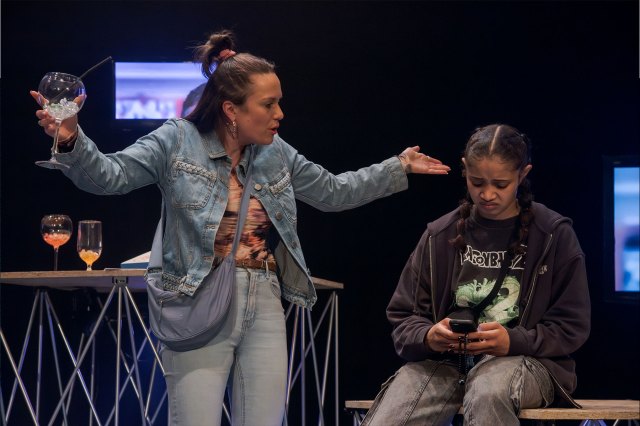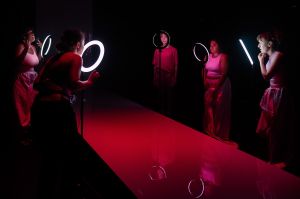Wish You Weren’t Here at Sheffield Theatres’ Tanya Moiseiwitsch Playhouse and on tour – review
Katie Redford’s two-hander will also visit Northern Stage, Soho Theatre, Brighton Dome and Guildford’s Yvonne Arnaud Theatre

As befits a play that is to tour to schools, the first impression on entering the Playhouse is of simplicity: three television screens show a Ferris Wheel and a Scarborough road sign fractured in two and, as the play progresses, the screens switch between various background settings and TV broadcasts that the performers find themselves watching. Assorted structures of different heights are spread around the stage, suitable for standing on or using as tables.
Into this set, two contrasted figures enter; Lorna, a young single mother determined that she and her teenage daughter are going to have a great time on holiday, and the aforementioned daughter Mila, her every expression and gesture conveying “grumpy teenager”. At first one’s sympathies are totally with Mila. The fact that she loved Scarborough as a child is hardly a reason for its being chosen as a destination to celebrate her examination results as opposed to London or even Portugal where she recently holidayed with her father. Furthermore Lorna’s excessive cheerfulness and harping back to the past – why does Mila make a fuss about them dancing together? – would penetrate a thicker skin than any normally sensitive 16-year-old possesses – and she seems unaware that teenagers don’t wish to be photographed all the time!
Mila is almost cast in the role of mother as Lorna fixes a date for herself with the guy at the amusement arcade. Disgusted that he only drinks apple juice and talks shop, Lorna then proceeds to get smashed having failed to get Mila to join her. But it’s Mila who springs the big surprise: she has her grandmother’s ashes in a food bag (later transferred to a seaside bucket). After all, Nan was a big part of their holidays in Scarborough as witnessed by memory scenes on the television screens. The question of Nan’s role is central, if unresolved. Mila says that she was brought up by her, not her mother; Lorna’s bitterness in claiming her mother loved Mila more is palpable.
The final reconciliation scene comes after a highly convincing stand-up row between the two and a rather less convincing statement of Lorna’s huge respect for the intelligence of her child. No matter: the play survives on the wit, truth and economy of Katie Redford’s writing, directed with seldom a wasted gesture by Rob Watt, and the neat teamwork of the two actors. Olivia Pentelow, in her stage debut, is perfect as Mila, moving from sullen lack of involvement to blazing sincerity at the click of a switch. Eleanor Henderson has a more difficult path, but succeeds in convincing us of the character even when the temptation is to throw something at her.
I would question the decision to limit the play to an hour-long one-acter: there were more depths to be explored and issues such as climate change deserve more attention. But perhaps one hour was considered more suitable for school performances.















